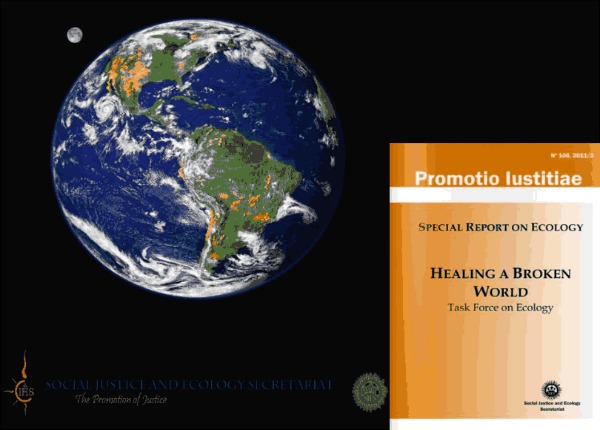

The Church has been insisting on the need for us to collaborate in the efforts to preserve the environment, writes Fr. Patxi ÃÂlvarez SJ.

Editorial: Healing a Broken World by Patxi ÃÂlvarez SJ
I have the pleasure of presenting you with this document on ecology, fruit of the
generous and enthusiastic labor of the Ecology Task Force. The document was
elaborated between July and November 2010 by experts, both Jesuit and lay,
coming from all the Conferences.
The deterioration of the environment as a result of human activity has taken on
a decisive importance for the future of our planet and for the living conditions
of coming generations. We are witnessing a growing moral consciousness
regarding this reality.
The Church, and especially the two most recent Popes, have been insisting on
the need for us to collaborate in the efforts to preserve the environment, and
thus to protect creation and the poorest populations, who are those most
threatened by the consequences of environmental degradation.
The Society of Jesus is also involved in this task. Many Jesuits and collaborators
who accompany poor farming communities are attempting to protect the
environment and promote sustainable development as an essential condition for
the future. The younger generations of Jesuits are especially sensitive in this
regard. Some Conferences have made the ecological question an apostolic
priority. Most definitely, the Society is engaged in many efforts in this field.
Nevertheless, we are still in need of a change of heart. We need to confront our
inner resistances and cast a grateful look on creation, letting our heart be
touched by its wounded reality and making a strong personal and communal
commitment to healing it.
The present document seeks to be one more aid in this long journey, which
requires sincere dedication on our part. The text treats a complex topic with
rigor. It helps us understand the present situation, allows us to make it a more
integral part of our mission, and offers us a series of valuable, well thought-out
recommendations, which we should consider seriously in our institutions,
communities, and provinces.
Its main message, though, is one of hope: we still have time to save this
wounded creation. It is now up to us to make our own small contribution.
I am confident that our reading of and praying over this text, as well as dialogue
on this topic among ourselves and in our communities and institutions, will
help us to keep advancing in our journey toward reconciliation with our wounded natural world.
Patxi ÃÂlvarez SJ
Director
Social Justice and Ecology Secretariat
General Curia of the Society of Jesus
Rome, Italy

